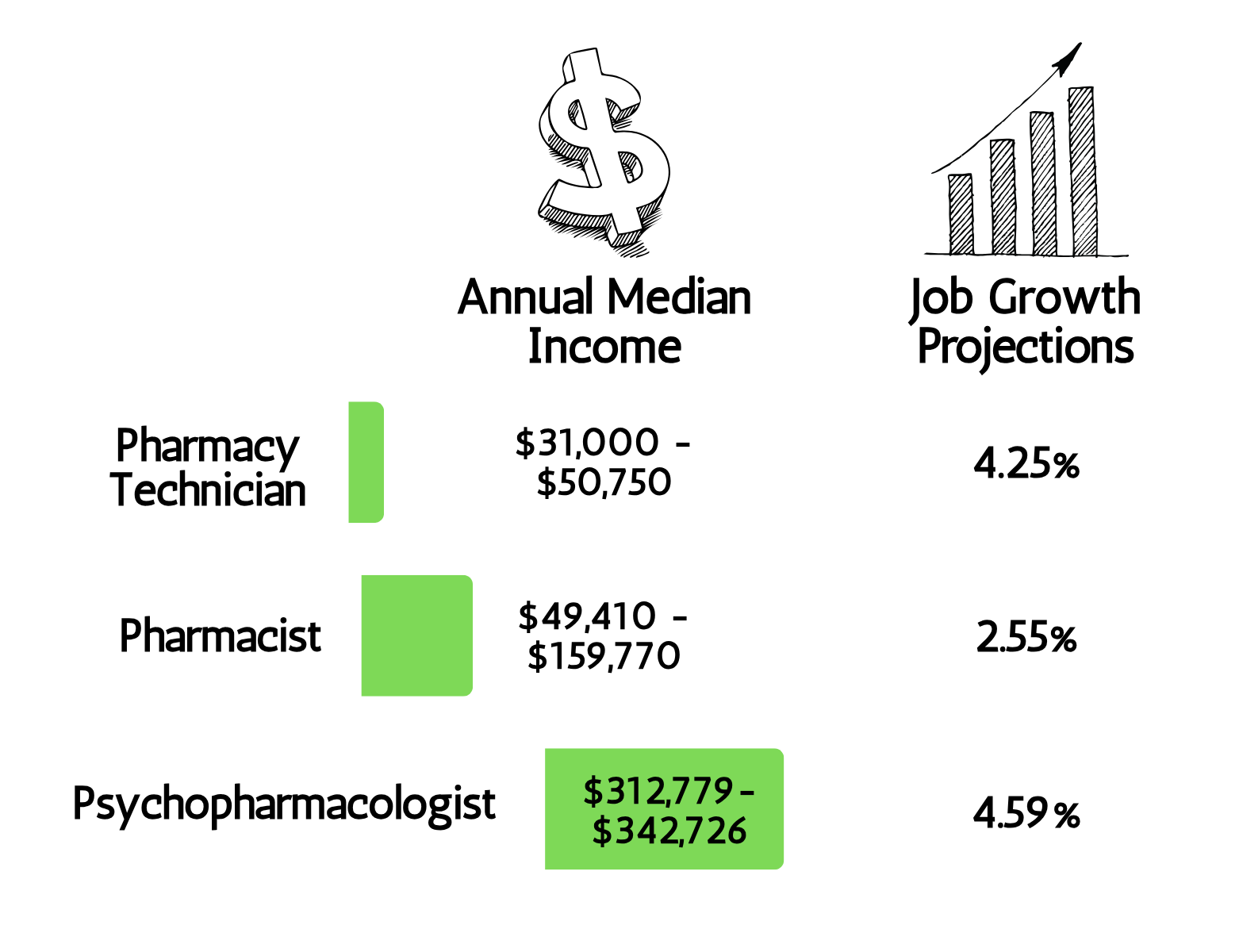Pharmacy & Psychopharmacology Careers:
Caring Through Chemistry
Do you like science and helping people feel better? Are you interested in how medicines work in the brain and body? If so, a career in pharmacy or psychopharmacology might be perfect for you! These careers let you work with patients who have mental health or substance use challenges. You can be a part of the team that helps people live healthier, happier lives.
Is Working in Pharmacy or Psychopharmacology for You?
Learn More About Pharmacy & Psychopharmacology Careers:
National Pharmacy Technician Association (NPTA)
American Society of Clinical Psychopharmacology
Ohio Pharmacists Association
Pharmacy Technician (Career OneStop)
Pharmacy Technician (O*Net Online)
Pharmacists (Career OneStop)
Pharmacists (O*Net Online)
Psychopharmacology: US Bureau of Labor Statistics
Learn More About Licensure:
Ohio Board of Pharmacy: Pharmacy Technician Licensing
Ohio Board of Pharmacy: Pharmacist Licensure
Become a Certified Pharmacy Technician (NPTA)
*Please note that the job recommendations listed throughout this page will vary by agency and county, as some may require additional training or licensure.
Your Path to a Career in PHARMACY & PSYCHOPHARMACOLOGY
What does it take?
Get Educated
Get Experience
Get Licensed*
Get Ahead
*Licenses are offered by the State of Ohio or other National Organizations. They show you’re a trusted professional in the field.
Income varies and is based on role, location, experience, education, and licensing/credentials. Job growth projections are for 2023-2033. Ohio LMI
Salary ranges are based on what’s currently available through Zip Recruiter, Indeed, Career One Stop, or Salary Expert.

Get more info in the FAQs
PHARMACY PROFESSIONALS - FAQ
-
You get to understand how medications affect the brain and mood.
You work closely with doctors, nurses, therapists, and other mental health professionals.
You use science and critical thinking every day.
You help people recover and live better lives.
There are lots of job options in hospitals, clinics, universities, and more.
If you enjoy neuroscience, teamwork, and helping people, this could be a great career for you.
-
With a high school diploma/GED and training program:
Pharmacy Technician
A pharmacy technician helps pharmacists by organizing and preparing medications. In behavioral health care, they might count pills, label bottles, and keep track of medicine supplies. They also help with prescription and insurance paperwork and make sure prescriptions are filled correctly. In Ohio, pharmacy technicians must be certified and follow safety rules to protect patients.
With a doctoral degree:
Pharmacist (Pharm.D)
In behavioral health settings, pharmacists play a key role in managing psychiatric medications by ensuring safe, effective, and appropriate use. They monitor for side effects, drug interactions, and adherence, especially with complex regimens. Pharmacists also collaborate with healthcare teams to optimize treatment plans and educate patients about their medications to support better mental health outcomes.
Psychopharmacologist (Pharm.D, Ph.D., Psy.D, or MD)
A psychopharmacologist is a specialist who studies how medicines affect the brain and behavior. They focus on using medications to treat mental health conditions like bipolar disorder or schizophrenia. In Ohio, psychopharmacologists often work with doctors and researchers to find the best treatments for patients. They may also help monitor how well a medicine is working, the side effects and reactions to other medications, and adjust doses if needed.
Researcher
Researchers help us better understand mental health, addiction, and ways to improve care. They design and lead studies that answer big questions—like what treatments work best or how to reach people in need. They write reports and share their findings to help improve services. Pharmaceutical researchers often lead medication-based clinical trials. [Learn more about Research careers→]
Other job titles you may see:
Professor
Behavioral health medication consultant
These professionals play key roles in helping people with mental health challenges feel better and live healthier lives.
-
Help patients get the right medications for mental health or substance use treatment.
Explain how medications work and how to take them safely.
Monitor side effects and help adjust medication plans.
Work with patients, family members, doctors, and mental health professionals.
Research new medicines and how they affect the brain.
These professionals help patients use medications safely and effectively to support their mental health.
-
Hospitals
Mental health clinics
Pharmacies
Research centers and universities
Community treatment centers
They work wherever patients need help with medication.
-
Teens and Adults: Monitor psychiatric medications, manage side effects, and ensure safe, effective treatment
People Recovering from Substance Use: Support medication-assisted treatment and prevent harmful drug interactions
Older Adults: Adjust medications to manage memory or mood changes while minimizing cognitive side effects
People with Serious Mental Illness: Optimize complex medication regimens and support long-term treatment plans
They help people of all ages and backgrounds who need support with mental health or addiction recovery.
-
Pharmacy Technicians usually need a certificate or associate’s degree (can take less than 2 years) from an approved training program. Training may be provided by your employer or in a vocational high school, as well as community colleges.
Pharmacists need a Doctor of Pharmacy (Pharm.D.)* degree (usually takes about 6–8 years after high school).
Psychopharmacologists often have a PharmD, Ph.D., or M.D. and advanced training and expertise.
*When pursuing a PharmD degree, choose a program that is accredited by the Accreditation Council for Pharmacy Education (ACPE)!
-
Registered Pharmacy Technician (RPhT) and Certified Pharmacy Technician (CPhT)
These credentials are obtained from the Ohio Board of Pharmacy.
Licensed Pharmacist
To become a licensed pharmacist in Ohio, you must earn a Doctor of Pharmacy (PharmD) degree, pass the North American Pharmacist Licensure Examination (NAPLEX), and the Ohio Multistate Pharmacy Jurisprudence Examination (MPJE), and obtain a license from the Ohio Board of Pharmacy.
Click here to learn more about licenses, credentials, and certifications.
Disclaimer: The information provided on this website is accurate to the best of our knowledge at the time of publication. If you notice any errors or outdated information, please contact accounts@mhaadvocacy.org so we can make the necessary corrections.


